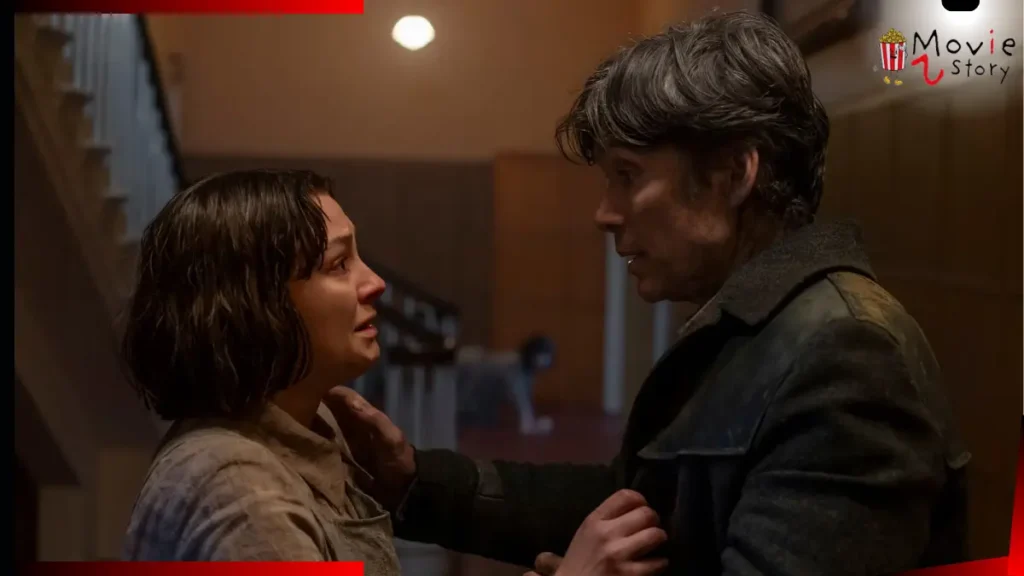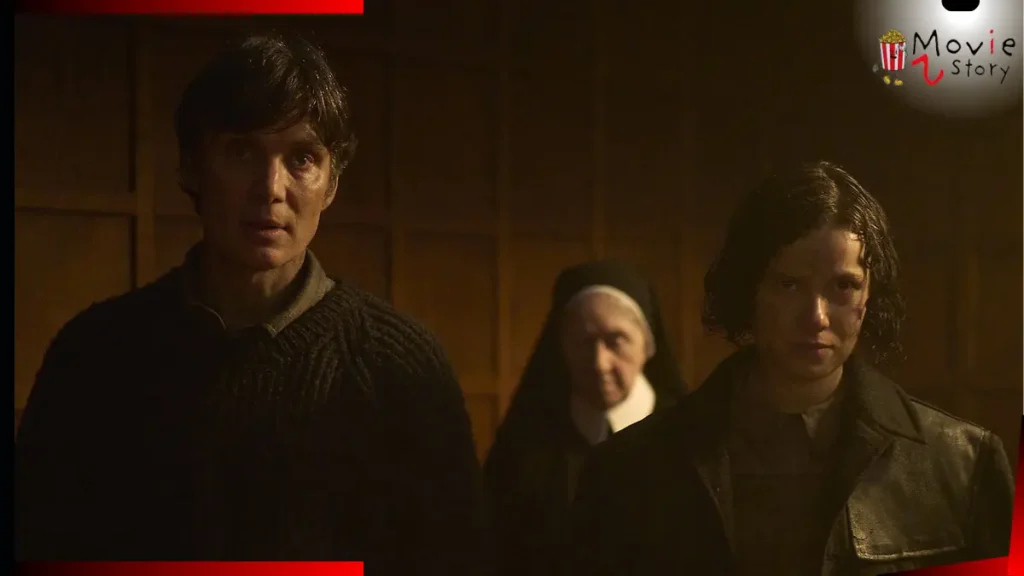Small Things Like These Movie Story: In the quiet, picturesque landscape of 1980s southeast Ireland, Small Things Like These, based on Claire Keegan’s Orwell Prize-winning novel, brings to the screen the harrowing reality of the Magdalene Laundries. Known for their oppression and abuse of “fallen” women—women who were unmarried and pregnant—the laundries were institutions run by the Catholic Church. The story centers on Bill Furlong, played by Cillian Murphy, a soft-spoken and introspective coal merchant whose simple life in the Irish countryside intersects with the dark secrets concealed within the local convent.
Small Things Like These Movie Story
Bill Furlong, a reserved coal and timber merchant, lives a modest life, barely managing to provide for his wife, Eileen, and their daughters. Despite financial constraints, Bill has created a stable, nurturing environment for his family. Raised by his single mother after an unexpected pregnancy, he understands the weight of shame and struggle that can haunt a family. His mother was spared the harsh fate of being sent to a Magdalene Laundry, thanks to the kindness of a wealthy woman who took them in. This memory plays a significant role in Bill’s understanding of the world around him, marked by resilience, hardship, and compassion.
As Christmas approaches, Bill’s mind is filled with reflections on his past and memories of childhood poverty. One Christmas, he recalls receiving a hot water bottle as a gift instead of the jigsaw puzzle he had desperately wanted. These memories ground Bill’s perspective and give him a sense of empathy that becomes pivotal as he encounters the horrors unfolding in the convent.
Small Things Like These (2024) Official Trailer
A Disturbing Encounter Outside the Convent
One day, during a routine coal delivery to the convent, Bill witnesses something that unsettles him deeply. He sees a young woman, visibly distressed, being dragged toward the convent by force. The girl, presumably unmarried and pregnant, is brought there by her family, fearing the shame she would bring upon them. This woman’s desperation and resistance trigger something within Bill—a haunting reminder of his own mother’s potential fate had she not received help. The image of the struggling girl ignites a conflict within him, forcing him to confront a harsh reality that the townsfolk often avoid acknowledging.
The Chilling Atmosphere Inside the Convent
In subsequent visits to the convent, Bill’s unease grows. The convent and its laundry operate under a strict and ominous regime, supervised by the intimidating Sister Mary, portrayed with chilling resolve by Emily Watson. Sister Mary is a woman of few emotions, exuding a bureaucratic ruthlessness that maintains control over the young women in the laundry. Her authority is respected and feared, as she represents the power of the Church, which holds sway over the entire town.
During one delivery, Bill has a fateful encounter that leaves him shaken. As he walks through the convent, he catches glimpses of young women toiling in silence, faces marked by fear and despair. The scene is eerily Dickensian, evoking memories of characters oppressed by circumstances beyond their control. Each woman he sees brings to mind his mother’s face, underscoring the vulnerability of women who lack support and protection. Sister Mary, recognizing the potential threat Bill poses, uses subtle intimidation to remind him of the Church’s influence, including control over his daughters’ education.

A Growing Sense of Guilt and Responsibility
Bill’s internal struggle intensifies after these encounters. He finds himself waking in the middle of the night, unable to shake the images of the young women imprisoned within the convent walls. His wife, Eileen, notices his growing distress and advises him not to meddle in matters that don’t concern them, warning of the risks involved in opposing the Church. Eileen’s words reflect the broader mentality of the town, where people, even with suspicions about the convent’s activities, remain silent to protect their livelihoods and social standing.
The townspeople frequently caution Bill, reminding him of the potential consequences his family might face if he disrupts the Church’s operations. The nuns, after all, run the only school in town, and Sister Mary holds the power to impact his daughters’ futures. This web of control and complicity effectively suppresses dissent, making it clear to Bill that his actions could lead to significant personal and familial repercussions.
The Magdalene Laundries’ Legacy of Suffering
As Bill wrestles with his conscience, the film delves into the historical context of the Magdalene Laundries, a system where more than 56,000 women and girls were held between 1922 and 1998 under the guise of “penance and rehabilitation.” These women, labeled as “fallen” due to pregnancies out of wedlock or perceived moral failings, were subjected to forced labor, with many losing their children to forced adoptions. The laundries operated as profit-driven institutions, using the women as unpaid laborers and subjecting them to inhumane treatment.
In 1993, the discovery of a mass grave at a convent laundry near Dublin exposed the horrors of these institutions. The findings sparked outrage and led to government apologies, as well as the establishment of a National Centre for Research and Remembrance on the site of the last operational laundry. Small Things Like These doesn’t aim to recount the full scale of this tragedy but instead focuses on the personal and societal dynamics that allowed it to continue unchecked for so long.

A Turning Point: Compassion vs. Fear
As Christmas draws near, Bill’s inner turmoil reaches a breaking point. He’s torn between the desire to help the suffering women and the fear of jeopardizing his family’s safety. His role as a father and a husband anchors him in a life built on stability and routine, yet his conscience pulls him toward confronting the injustice he has witnessed. This struggle is vividly portrayed through Murphy’s powerful, nuanced performance, which captures Bill’s silent rage and helplessness, exposing his vulnerability as he grapples with the implications of his choices.
Bill’s reluctance to take action embodies the broader societal apathy and fear that permitted institutions like the Magdalene Laundries to operate with impunity. The townspeople’s reluctance to question the Church reflects the complex dynamics of power and complicity, where individuals feel powerless against oppressive systems. His wife’s cautionary words—“if you want to get on in life, there are things you have to ignore”—mirror the mindset that perpetuated the Church’s stranglehold on the community.
A Searing Performance by Cillian Murphy
Murphy’s portrayal of Bill Furlong has been widely praised for its emotional depth and intensity. Known for his role in Oppenheimer, Murphy delivers a performance marked by subtlety and restraint, channeling the silent strength and vulnerability of his character. As Bill grapples with memories of his own mother’s hardships and his encounters with the convent’s oppressed women, Murphy captures the psychological toll of bearing witness to unspeakable suffering. His character becomes a symbol of Ireland’s collective silence, a representation of the societal trauma that lingered long after the Magdalene Laundries were exposed.
Murphy, who also served as a producer for the film, was deeply invested in bringing Keegan’s novel to life with authenticity and sensitivity. He collaborated closely with director Tim Mielants, aiming to preserve the novel’s “quiet tone and space” on screen. Both Murphy and Mielants were committed to creating a film that honored the victims’ experiences while exploring the nuanced motivations of those who, knowingly or unknowingly, upheld the Church’s oppressive system.

A Haunting Reflection on Silence and Complicity
Small Things Like These transcends its historical setting, raising questions that resonate with modern audiences. It challenges viewers to confront uncomfortable truths about complicity, moral responsibility, and the consequences of silence. Through Bill’s journey, the film examines how individuals and communities become complicit in perpetuating injustice, either through fear or a desire to maintain the status quo. The narrative draws parallels to contemporary movements like #MeToo, which also seek to dismantle systems of power that thrive on silence and complicity.
In the end, Small Things Like These doesn’t offer easy answers or a neat resolution. Bill’s moral struggle embodies the complexity of confronting institutionalized cruelty, where the cost of intervention can feel overwhelming. The film’s conclusion, left deliberately ambiguous, invites viewers to ponder whether Bill’s actions were enough to challenge the system or if he, like so many others, was ultimately powerless to effect change.
A Quiet Yet Powerful Cinematic Experience
Directed by Tim Mielants, Small Things Like These has been praised for its subdued yet impactful storytelling. Mielants and screenwriter Enda Walsh crafted a narrative that maintains a literary intensity, juxtaposing the quiet simplicity of Bill’s daily life with the dark secrets hidden within the convent. The film’s pacing, combined with its emphasis on atmosphere and character-driven storytelling, creates a deeply immersive experience that resonates long after the credits roll.
Unlike other films on the same subject, such as The Magdalene Sisters and Philomena, Small Things Like These approaches the story with a quiet restraint, focusing less on the broader historical scope and more on the intimate journey of one man grappling with his conscience. This approach allows the film to explore the emotional weight of witnessing injustice, making it a powerful and thought-provoking exploration of personal and societal accountability.

Small Things Like These Movie Ending Explained
The ending of Small Things Like These (2024) centers on Bill Furlong’s final confrontation with his conscience and the oppressive institution that has gripped his town. After witnessing the abuse and harsh treatment of young women held at the convent, Bill’s own buried trauma resurfaces, pushing him toward a breaking point. The memories of his impoverished childhood, coupled with his knowledge of the horrors unfolding within the convent walls, force him to acknowledge a painful truth: he cannot continue to ignore the injustices happening around him. Haunted by his own past and the plight of these vulnerable young women, Bill knows that any action he takes could lead to severe consequences for his family, especially since the nuns hold influence over his daughters’ education and social standing in the community.
As Bill slips into the convent to deliver an invoice, he comes face to face with Sister Mary, the head of the institution. Emily Watson’s portrayal of Sister Mary as cold and calculating only intensifies Bill’s sense of helplessness. She warns him subtly, making it clear that she has the power to harm his family’s future if he threatens her authority. This chilling encounter brings out the full weight of Bill’s moral dilemma, amplifying the internal conflict he has grappled with throughout the film. The town’s complicity and silence loom over him, embodying the fear that has kept so many locals from standing up against the abuses hidden in plain sight. For Bill, the moment marks a turning point, as he realizes he must either uphold the silent complicity or find the courage to act.
In the final scenes, Bill takes a decisive, quiet stand against the convent. This act is portrayed with subtlety, leaving audiences with a sense of ambiguity about the outcome of his decision. The screenplay’s nuanced approach keeps the exact nature of his actions open to interpretation, suggesting that Bill’s stand, though small in scale, is an attempt to assert some moral agency in a world dominated by oppressive forces. However, the scene is neither triumphant nor conclusive; instead, it reflects the quiet, painful resistance of one man determined to make a difference, even if it means facing alienation from the very community he has served.
The film’s closing moments carry a sense of both dread and hope. Text on the screen honors the real-life victims of the Magdalene Laundries, emphasizing the weight of the historical tragedy that inspired the story. For Bill, this small act of defiance symbolizes a glimmer of redemption and the possibility of change, even if the cost is high. The screen fades to black, leaving the viewer with an uneasy, lingering question about whether such acts of resistance, however minor, are enough to combat the broader systems of control and cruelty. The ending reinforces the central theme of Small Things Like These: the importance of small acts of goodness in the face of institutional power, even when the outcome remains uncertain.

Conclusion: Small Things Like These Movie Story
Small Things Like These reminds us that even small acts of kindness and compassion can make a profound impact. Bill’s decision to confront the darkness within his community, though seemingly small, reflects a powerful resistance against an oppressive system.
The film celebrates the courage of individuals who dare to question authority and offers a sobering reminder of the price that can come with standing up for what is right. Through Bill Furlong’s story, Small Things Like These serves as a testament to the resilience of the human spirit and the importance of holding onto hope, even in the face of overwhelming adversity.
Top Movie Ratings
| Imdb | 7.3/10 |
| Rotten Tomatoes | 93% |
| Metacritic | 81% |
Latest Release New Movies:

